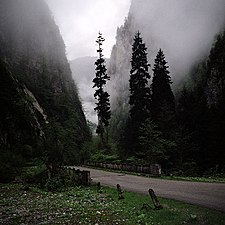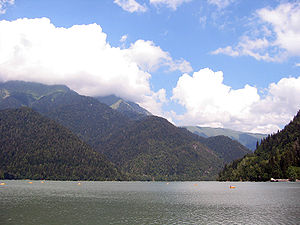geo.wikisort.org - Reservoir
Lake Ritsa (Abkhazian: Риҵа, Georgian: რიწა, romanized: rits'a) is a lake in the Caucasus Mountains, in the north-western part of Abkhazia, North Caucasus surrounded by mixed mountain forests and subalpine meadows. The road from the Black Sea coast was built in 1936. The resort of Avadhara lies to the north of the lake. The lake was an important tourist attraction during the Soviet period. It is still frequently visited by Russian tourists.
| Lake Ritsa | |
|---|---|
 Ritsa Lake | |
 Lake Ritsa  Lake Ritsa | |
| Location | Abkhazia, Georgia |
| Coordinates | 43°29′N 40°33′E |
| Primary inflows | Lashipsa River |
| Primary outflows | Iupshara River |
| Basin countries | Georgia |
| Surface area | 1.49 km2 (0.58 sq mi) |
| Max. depth | 116 m (381 ft) |
| Shore length1 | 4.29 km (2.67 mi) |
| Surface elevation | 950 m (3,120 ft) |
| Islands | 0 |
| Settlements | Avadhara |
 | |
| 1 Shore length is not a well-defined measure. | |
Geography
Lake Ritsa is the deepest lake in the autonomous republic of Abkhazia (116 m), and is rich in trout. It is fed by six rivers and drained by one, the Iupshara River.[1]
Environment
Lake Ritsa's water is cold and clear. Mountains with heights of 2,200 to 3,500 m surround the lake. The region around Lake Ritsa is a part of the Euxine-Colchic deciduous forests ecoregion with a fairly high concentration of evergreen boxwood groves. Many specimens of the Nordmann Fir, which reach heights of over 70 metres (230 ft), are found around the lake.
In 1930 the Ritsa Nature Reserve (162.89 km2) was established to protect the natural state of the lake and the surrounding land.
Notable residents
The Soviet leader Joseph Stalin had one of his summer-houses (dacha) by the lake.[2] Later Leonid Brezhnev had his summer house nearby as well. Today the dacha belongs to the de facto Government of Abkhazia.
Climate
The average annual temperature in the area is 7.8 degrees Celsius (January −1.1 °C, August 17.8 °C). The mean annual precipitation is approx. 2,000–2,200 mm. Winters are sometimes snowy, summers warm.
Legends and stories of Ritsa
There are many legends and fairy tales about the lake.[3]
Origin
In ancient times there was a valley and a river at the site of the modern lake. A girl named Ritsa lived there with three brothers Agepsta, Atsetuka and Pshegishkha. Ritsa used to pasture her animals in the valley and her brothers hunted in the high mountains by day and returned to the valley in the evening, where they ate, sang songs, and admired their sister.
Once the brothers went too far into the mountains. Ritsa missed them and sang. The forest robbers Gega and Iupshara heard her and decided to kidnap her. Iupshara caught her and rode down the valley, while Gega covered his flank. Ritsa's brothers heard her crying and came to the rescue.
Pshegishkha threw a sword at the robbers, but he missed and the sword flew over the river. The valley was filled with water and turned into a lake. Ritsa broke from Iupshara's grip, but fell into the lake. The brothers couldn't save her. Then Pshegishkha threw the robber Iupshara into the lake, but Ritsa's water wouldn't accept him and threw out him over Pshegishkha's sword and the water carried him away to the sea. Gega ran after Iupshara, but he didn't manage to rescue him.
Out of grief, the brothers turned into mountains, and today they are still standing here to protect the resting-place of Ritsa.
Goodbye, Motherland!
Several myths have risen up about origin of the name "Goodbye Motherland!" given to cliff and observation deck on the road to Lake Ritsa. It appears the name was coined by tourist guides, as the area's real name is "Chabgar Cornice." One story goes that in the 1930s, during the construction of Stalins's dacha, soldiers had to transport building materials along the precarious, narrow mountain road. During one of these trips, in one of the most precarious spots, a truck fell from the edge. As the truck was falling, the driver cried: "Goodbye, Motherland!" ("Прощай, Родина!").[4] Another legend says a truck with captured Germans fell into the abyss. Some of the Germans, who had fallen in love with Abkhazia as a native country, shouted: "Farewell, Motherland!" Yet another says there were not prisoners in the truck, but soldiers retreating along the road at night. On a narrow road, the driver lost control and the truck fell into an abyss.[5]
Gallery
- Road to lake Ritza
- Tourists boating at Ritsa
- Ritsa Lake in 2013
See also
- Lake Smaller Ritsa
- Ritsa Strict Nature Reserve
References
- "State of the Environment Georgia - Biodiversity". 2016-05-08. Archived from the original on 2016-05-08. Retrieved 2021-08-29.
- "Ritsa Nature Reserve".
- World, Abkhaz. "Lake Ritsa: an Abkhazian legend". Abkhaz World | History, Culture & Politics of Abkhazia. Retrieved 2021-08-29.
- "Op Brotherhood". ED Forums. Retrieved 2021-08-29.
- "Смотровая площадка «Прощай, Родина» в Абхазии". Туристер.ру (in Russian). Retrieved 2021-08-29.
На других языках
[de] Riza-See
Der Riza-See (abchasisch Риҵа; georgisch რიწა; russisch Рица) ist ein See in Abchasien an der Südflanke des nordwestlichen Großen Kaukasus.- [en] Lake Ritsa
[es] Lago Ritsa
El lago Ritsa (en abjaso: Риҵа, en georgiano: რიწა, en ruso Рица) se encuentra en el norte de Abjasia, Georgia es un lago en las Montañas del Cáucaso, rodeado de montañas pobladas con bosques mixtos y vegetación subalpina. El agua es fría y clara. Las montañas que rodean al lago tienen una altura entre 2000 y 3500 metros. Muchas especies de abetos (Abies nordmanniana) que llegan a una altura de 70 metros se encuentran en los alrededores del lago.[fr] Lac Ritsa
Le lac Ritsa (en géorgien : რიწა, en abkhaze : Риҵа) est un lac de Géorgie (Abkhazie).[it] Lago Ritsa
Lago Ritsa è un lago delle montagne del Caucaso, nella parte nord-occidentale dell'Abkhazia, circondato da boschi e prati subalpini. La località di Avadhara si trova a nord del lago. Il lago fu un'importante attrazione turistica durante il periodo sovietico ed è tuttora frequentato da turisti russi.[ru] Рица
Ри́ца[2] (Большая Рица; абх. Риҵа, груз. რიწა) — горное озеро ледниково-тектонического происхождения на Западном Кавказе, в Абхазии, в Гудаутском районе частично признанной Республики Абхазии, согласно административному делению Грузии — в Гудаутском муниципалитете Абхазской Автономной Республики[3]. Крупнейшее озеро Абхазии.Другой контент может иметь иную лицензию. Перед использованием материалов сайта WikiSort.org внимательно изучите правила лицензирования конкретных элементов наполнения сайта.
WikiSort.org - проект по пересортировке и дополнению контента Википедии


